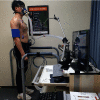Effects of Caffeine Intake on Cardiopulmonary Variables and QT Interval after a Moderate-Intensity Aerobic Exercise in Healthy Adults: A Randomized Controlled Trial
- PMID: 35036429
- PMCID: PMC8754617
- DOI: 10.1155/2022/3170947
Effects of Caffeine Intake on Cardiopulmonary Variables and QT Interval after a Moderate-Intensity Aerobic Exercise in Healthy Adults: A Randomized Controlled Trial
Retraction in
-
Retracted: Effects of Caffeine Intake on Cardiopulmonary Variables and QT Interval after a Moderate-Intensity Aerobic Exercise in Healthy Adults: A Randomized Controlled Trial.Biomed Res Int. 2023 Dec 29;2023:9783201. doi: 10.1155/2023/9783201. eCollection 2023. Biomed Res Int. 2023. PMID: 38188790 Free PMC article.
Abstract
Caffeine is considered a widely consumed natural and legal psychoactive stimulant with several effects on the body. The present study attempted to investigate the effects of caffeine consumed before and after a physical exercise on cardiovascular and cardiorespiratory functions in healthy adults. 36 healthy adult males were recruited and randomly allocated to one of the three (3) groups: group I (exercise without caffeine consumption), group II (caffeine beverage intake before exercise), and group III (caffeine beverage intake immediately after exercise). The heart rate (HR), QTc interval, blood pressure (BP), respiratory rate (RR), oxygen consumption (VO₂), and carbon dioxide emission (VCO₂) were measured at 0, 5, 10, and 15 min after the exercise. We observed a significant difference in all measured outcomes during the different recovery times in all the groups (p < 0.05). HR, RR, SBP, VO2, and VCO2 gradually decreased with time, DBP contrarily increased with time, and the QTc showed an irregular pattern. We can affirm that ingestion of caffeine before and after moderate aerobic exercise slows down the parasympathetic stimulation, heart rate recovery, and the recovery of HR and QTc with no major effects on BP, RR, VO₂, and VCO₂ in healthy adult men.
Copyright © 2022 JaeHo Yu et al.
Conflict of interest statement
The authors declare that there is no conflict of interest regarding the publication of this paper.
Figures





References
-
- Lee J. S., Park H. S., Han S. H., Tana G., Chang M. J. Study on relationship between caffeine intake level and metabolic syndrome and related diseases in Korean adults: 2013~ 2016 Korea National Health and Nutrition Examination Survey. Journal of Nutrition and Health . 2019;52(2):227–241. doi: 10.4163/jnh.2019.52.2.227. - DOI
-
- Kim M. G., Kim S. D. Factors affecting coffee intake in Korean adults. Journal of the Korea Academia-Industrial cooperation Society . 2020;21(3):529–536.
-
- Evans J., Richards J. R., Battisti A. S. StatPearls . StatPearls Publishing; 2021. Caffeine. - PubMed
Publication types
MeSH terms
Substances
LinkOut - more resources
Full Text Sources
Medical

